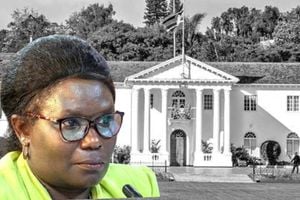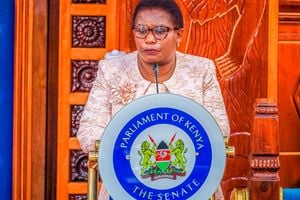
Meru Governor Kawira Mwangaza.
Meru Governor Kawira Mwangaza’s impeachment in the Senate could test new legal grounds, with a 2019 law that was to solve transition chaos and a High Court determination coming to the fore.
Contrary to interpretations and calls by the Members of the County Assembly (MCAs) and locals that Deputy Governor Isaac Mutuma M'Ethingia takes office after the Senate sealed Ms Mwangaza’s fate last Tuesday in a plenary trial, the court’s reprieve could give her room to wiggle out and also challenge the impeachment motion at the Assembly.
The High Court order allowed Ms Mwangaza to stay in office pending the determination of her case challenging her removal from office.
Section 11 (2) of the Assumption of office of Governor Act states: “The County Governor-elect shall be sworn-in on the first Thursday after the tenth day following the declaration of the final results of the election of the County Governor by the Commission.”
This read together with Section 16 on the swearing in of DG who assumes office, provides “the swearing in ceremony of a Deputy Governor who assumes the office of the County Governor, shall be conducted in a public ceremony before a High Court Judge.”
It also applies to a DG nominee to fill the vacant position as well as the County Assembly speaker in the absence of the top two officials.
According to lawyer Peter Wanyama, the High court stayed the Senate decision despite Gazettement of the resolution, which was to pave way for the swearing-in of the deputy governor as has happened in the past.
“The High court orders are valid. They are not overtaken by events. They stop implementation of the impeachment resolution. This means the assumption of office of governor committee cannot be convened to prepare for swearing in, including gazetting venue of the swearing in, the Chief Justice (CJ) cannot nominate a judge to president over the ceremony,” said Mr Wanyama.
He makes reference to the former Wajir governor Mohamed Abdi Mohamoud’s case when he was impeached close to midnight and the following morning, a judge had been Gazetted and the then Deputy Ahmed Ali Muktar sworn-in to office despite an existing court order against this.
“In the Mwangaza impeachment, the decision was made early in the morning but later stayed by the High court,” said Mr Wanyama, noting that the existing law has also addressed chaos witnessed in the past.
“This is the law that guides assumption to office of governor upon election or impeachment of a governor. Before this law was enacted a governor would be impeached at midnight and deputy sworn in the following day at 8am.”
He adds, “The law removed the chaos by providing a framework that guides the process. The statute was extensively interpreted by a three judge bench of the High court in the impeachment of the governor of Wajir.”
Mr Wanyama said in law, a Gazette notice simply communicates to the public a substantive decision that a public officer or a state institution makes.
The Senate confirmed the substantiation of three charges against the governor; on abuse of constitution and other laws, gross misconduct and abuse of office.
Some Meru residents and MCAs celebrated her sacking while others have rallied behind her as was the case in Wajir county.
Meru MCA Zipporah Kinya, the mover of the motion, took issue with the governor’s leadership and sought her removal.
The governor has resumed her normal duties and on Friday afternoon, she signed the Sh11.8 billion budget for 2024/2025 financial year.
Ms Mwangaza’ lawyer Elias Mutuma has maintained her innocence, arguing that she is a victim of lies. Lawyer Ndegwa Njiru, the counsel for the assembly, has vowed not to relent.
“We shall overcome all hurdles,” said Mr Njiru.
During Governor Wambora’s tenure, the Senate upheld his impeachment twice but he thwarted the planned swearing-in of his deputy then Dorothy Nditi, when he secured stay orders from a Kerugoya court.
He went ahead to secure a second term and completed his ten years in office.
In a classic chaotic case of Wajir where the governor was reinstated after ouster, in the ruling, presiding Judge Patrick Otieno and Justice Wamae Cherere ordered the ousted governor to resume office on March 10, 2022.
The court noted that the impeachment motion by the then MCA Abdullahi Isaack through a notice dated April 19 was conducted in violation of the right to public participation and the governor’s right to fair administrative action and fair hearing under Articles 10, 47 (1) and 50 (1) of the constitution and the county government’s Act and the standing orders of Wajir county assembly.
The court also noted that the proceeding of the assembly held on April 27, 2021 was in violation and disregard of court orders and therefore null and void.
The court argued that the governor was not validly removed from office by the impeachment process, which was held in contravention of Articles 10, 47, 50 and 196 of the Constitution.
The appointment of the DG and his subsequent nomination and appointment of a deputy was also null and void.
“An order of certiorari be and issued to quash the special issue of the Kenya gazette No 4703 dated 17/5/2021 issued by the 10th respondent’s chairman. As appropriate consequential relief, an order of mandatory injunction is granted against the 8th respondent Ahmed Ali Mukhkar, compelling him to handover and restore the office of the Governor of the County of Wajir to the 7th petitioner, Amb Mohammud,” reads the ruling.
The DG was ordered to serve for the remainder of the current term of the Office of Governor of County of Wajir.
So far, a total of 11 governors and three deputies have been impeached by MCAs since 2013, but only two county chiefs – former Nairobi Governor Mike Sonko and Ferdinand Waititu (Kiambu) and Kisii deputy governor Robert Monda – were successfully removed from office, with the others being rescued by the senate and the courts.
Respective county assemblies have voted to remove from office Ms Mwangaza (three times), Mr Mwangi wa Iria (former Murang’a governor), Mr Granton Samboja (former Taita Taveta governor), Kirinyaga’s Anne Waiguru, Mr Paul Chepkwony (former Kericho boss) the late Nyeri Governor Nderitu Gachagua, but they were saved by the Senate that rejected their ouster.
Mr Wambora and Mr Mohamoud were also kicked out of office by the MCAs and their removal upheld by the Senators. They, however, made a comeback to their offices after their removals were nullified by the courts.
Siaya Deputy Governor William Oduol and former Machakos deputy governor Bernard Muia Kiala also became targets of impeachment by MCAs but were served by the senate.
Mr Monda was, however, not lucky after the senate upheld his removal.








